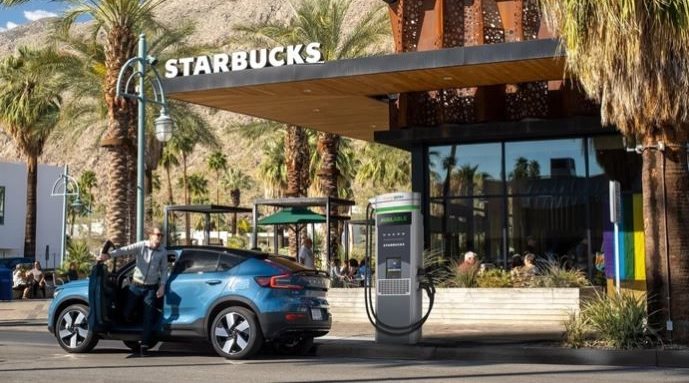While most South African electric vehicle (EV) owners will likely adopt an overnight top-up solution via home-installed charging boxes as a means of accommodating a weekly commute or school run, it stands to reason some adventure-focused customers will be keen to cover longer distances in their battery-electric cars. To this end, local companies like GridCars have already installed a relatively broad network of charging solutions along all three major routes in South Africa, the N1, N2 and N3. But, what to do whilst your vehicle is charging at one of these spots?
US-based coffee franchise Starbucks has partnered with Volvo Cars and charging infrastructure specialists Chargepoint to trial the viability of offering a network of charging stations positioned in the parking areas of its outlying US stores. The thinking, says chief sustainability officer for Starbucks, Michael Kobori, is that a customer is likely to plan a long-distance journey around stops for both a comfort break and, indeed, coffee. So the brand may as well include the option to charge your EV while you’re there.
“This is pairing the idea of electric vehicle charging with the fact that, hey, if you’re on a trip, you’re gonna stop along the way to get your Starbucks, to get your beverage, to get your breakfast etc.” says Kobori. “And if you’re sitting there, getting ready for your day and planning out your route and checking out, your car may as well be charging.”
With a forecast of 26 million EVs set to be negotiating US roads by 2030, Starbucks is looking to take advantage of its some 15,000 locations across all 50 states to offer an additional vital service to its customers.
The initial trial is set to be conducted on a 1350-mile (2,170km) route between Denver in Colorado and Seattle in the state of Washington. Around 15 new charging stations will be installed along this route, one or two at each Starbucks stop along the way. Rated at up to 60 kW DC, each station will have the potential to charge a modern EV from 20% to 90% in around 40-minutes; enough time to have a coffee and rest up before the next leg of the trip. With the operating range of each new generation EV getting more generous, most owners would look to stop around four times on a trip of this distance.
It's a partnership Volvo sees as mutually beneficial as it pursues a target of 100% EV sales by 2030, the US being a crucial market for this Swedish brand.
With an existing extensive network of petrol service stations positioned along all of South Africa’s main travel routes, would this kind of thinking from established convenience-focused brands the likes of Steers, Wimpy or Vida e Caffé prove viable?



















































